Kasese: In 2007, the government evicted hundreds of Basongora and Bakonjo communities who had settled in Queen Elizabeth National Game Park.
Majority of these were pastoralists. When they settled in some parts of Busunga , Lwamate, Nyakatonzi and Kichwambala, they experienced several challenges including lack of clean water for domestic use and for their cattle.
More than 15 years down the road, these communities are struggling to access clean water despite being surrounded by several rivers in the region.
Stephen Asaba , the chairperson of Busunga village in Kasese district says residents have to move more than 15km to access clean and safe water. This means they have to spare at least three hours each day to get to a water source, impacting their socio-economic well-being.
“Our children at times perform poorly as they spend more than 3 hours daily searching for clean water,” Asaba says.
Yusuf Kayigwa is a resident of Busanga and a teacher by profession. He says some of the would-be productive hours for the children are spent in search of good water.
It is a double whammy. During the dry season, they lose more than 500 animals according to Julius Kemigisha the speaker of Nyakatozi Parish Council.
During the heavy rains, River Nyamugasira and others flood leading to the spread of diseases like typhoid and dysentery.
Over the past week, journalists who belong to the Water and Environment Media Network (WEMNET), camped in Busongora to see firsthand the challenges that these communities face as a result of lack of access to clean and safe water.
The picture that emerged at the end of the tour was that of despair and hopelessness.
To be fair, efforts have been made by the government to provide water to these communities. They have set up water points managed by the National Water and Sewerage Corporation (NWSC) to improve access to clean water.
But the bigger challenge is that these water points are commercial. At first, the communities were told that a jerrycan of water could cost Shs 75, later the figure changed to Shs 150. Now it is Shs 200.

The residents think this is too expensive and given that someone could use more than 20 jerrycans a day for domestic and for agriculture this amounts to Shs 4,000 a day or Shs 130,000 per month. This forced many to abandon the water points.
Yosamu Kyomuntale, the LCII chairperson of Businga Parish says development partners like the World Bank and others have done several studies on how water access and sannitation can be improved in the communities. These studies have not been implemented.






